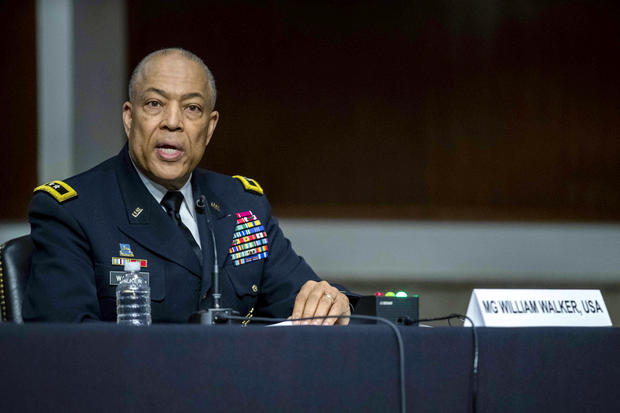Washington — The head of the District of Columbia National Guard revealed Wednesday it took Pentagon leaders more than three hours to approve a request for Guard troops to assist Capitol Police officers overwhelmed by the violent mob that breached the U.S. Capitol on January 6.
Major General William Walker, the commanding general of the D.C. National Guard, laid out a timeline for senators that began with a “frantic” phone call from then-Capitol Police Chief Steven Sund pleading for help, and ended with guardsmen finally arriving at the Capitol to help reestablish the security perimeter.
“Chief Sund, his voice cracking with emotion, indicated that there was a dire emergency on Capitol Hill and requested the immediate assistance of as many available National Guardsmen that I could muster,” he testified before a joint hearing of the Senate Rules and Homeland Security and Governmental Affairs Committees.
Walker said he received the call from Sund at 1:49 p.m. and immediately alerted Army leadership of the request.
“The approval for Chief Sund’s request would eventually come from the acting secretary of defense and be relayed to me by Army senior leaders at 5:08 pm — 3 hours and 19 minutes later,” he said. “We already had guardsmen on buses ready to move to the Capitol.”
Walker said personnel arrived at the Capitol less than 20 minutes after the Pentagon green-lit the request for help.
Robert Salesses, a senior Defense Department official, said then-Acting Defense Secretary Chris Miller approved sending National Guard members to the Capitol at 4:32 p.m., though word of the decision did not reach Walker for another 36 minutes.
The Senate panels convened Wednesday for a second hearing to examine the security failures surrounding the January 6 assault on the Capitol, when the violent rioters attempted to stop Congress from counting states’ electoral votes and reaffirming President Biden’s victory.
The attack, which led to the deaths of five people, including a Capitol Police officer, has prompted oversight hearings from Congress, as lawmakers work to determine why law enforcement was unprepared for the violence at the Capitol and whether information about threats of violence was shared by the intelligence community with law enforcement partners.
Walker also indicated to senators that the Pentagon hindered his ability to quickly deploy guardsmen needed to provide immediate assistance to civilian authorities, as then-Army Secretary Ryan McCarthy “withheld authority for me to employ the Quick Reaction force” in a January 5 letter, he told senators.
He called the limitations “unusual.”
Walker also revealed inconsistencies in his ability to swiftly deploy members of the National Guard to assist law enforcement during protests against police brutality in the summer of 2020 compared to January 6. He said he received immediate approval to send in troops to help with the response to demonstrations last summer, though that was not the case during the Capitol insurrection.
In addition to providing senators with the timeline before National Guard troops arrived at the Capitol, Walker also detailed a phone call at 2:30 p.m. January 6 involving himself, Sund, Metropolitan Police Chief Robert Contee, District of Columbia leaders and Army leaders.
During the call, Walker said Contee and Sund “pleaded” for the D.C. National Guard to get to the Capitol “with all deliberate speed.” But, he said, senior Army leaders “did not think it would look good” and were concerned the presence of uniformed guardsmen could incite the crowd.
Walker said he, like others on the call, were “stunned” by the response from Army leaders.
But Salesses, who spoke with former Pentagon officials involved in the decision-making January 6, said Lieutenant General Walter Piatt told him the word “optics” was never used and said Miller wanted to make decisions about how the National Guard was deployed, citing the events last summer.
Walker, however, said “there were people in the room with me on that call that heard what they heard.”


